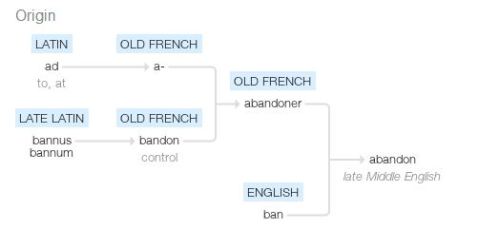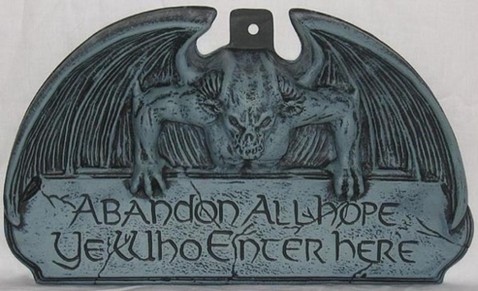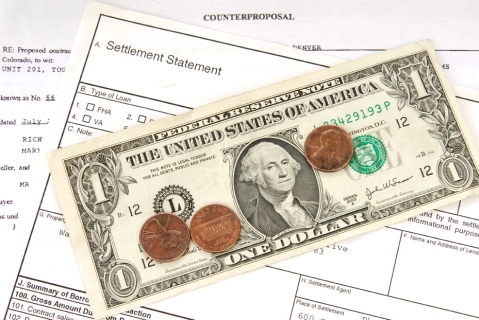30-Second Word Whoop: “Abandon”
 To love someone with abandon means to give it your all. Yet “abandonment” can be grounds for legal action.
To love someone with abandon means to give it your all. Yet “abandonment” can be grounds for legal action.
An abandoned puppy inspires pity and tenderness; an abandoned house, fear or disgust.
Let’s break this one down pictorially (because I know you can’t stop looking at the sad puppy picture):
 The operative word here is “control.” You lose control when you give up.
The operative word here is “control.” You lose control when you give up.
Abandon an idea (it dies); abandon a property (other forces like decline and decomposition take over); abandon a fight (the bad guys win); abandon a family (you are dead to them, Bud).
To eat or do anything with wild abandon? Requires exercising no self-control.
What I like about “abandon,” is it almost always gets to be on the first page of the dictionary. There’s a hidden definition for “abandoned” in mine — means “shamefully wicked” or “immoral.” So let’s check the other “good book” for some religious authority:
From Romans 1:27: “In the same way the men also abandoned natural relations with women and were inflamed with lust for one another.”
From 1 Timothy 4:1: “The Spirit clearly says that in later times some will abandon the faith and follow deceiving spirits and things taught by demons.”
 Dante’s early-14th-century epic poem Divine Comedy originated that not-so-tickly phrase: Abandon all hope ye who enter here,” the supposed warning at the gates of hell. From the 1814 translation into English by the Rev. H. F. Cary:
Dante’s early-14th-century epic poem Divine Comedy originated that not-so-tickly phrase: Abandon all hope ye who enter here,” the supposed warning at the gates of hell. From the 1814 translation into English by the Rev. H. F. Cary:
Through me you pass into the city of woe:
Through me you pass into eternal pain:
Through me among the people lost for aye.Justice the founder of my fabric mov’d:
To rear me was the task of power divine,
Supremest wisdom, and primeval love.Before me things create were none, save things
Eternal, and eternal I endure.
All hope abandon ye who enter here.Such characters in colour dim I mark’d
Over a portal’s lofty arch inscrib’d:
Whereat I thus: Master, these words import.
I echo the sentiment. Words carry great import; use them wisely. Abandon not thy dictionary.
30-Second Word Whoop: “Drag”
“Drag” sounds like no fun, unless you happen to be a smoker or cross-dresser.
Crosswinds can cause drag while sailing or racing.
Sometimes we must drag ourselves out of bed while dragging our favorite blankie and it’s all we can muster to drag a comb through our hair.
It’s no surprise, if you are a smoker, or even a judgmental non-smoker, that the roots of “drag” sound like a fire-breathing dragon, as in “Puff the Magic …”
According to the Online Etymology Dictionary, the verb form comes from the mid-15th century:
… from Old Norse draga, or a dialectal variant of Old English dragan “to draw,” both ultimately from Proto-Germanic *dragan “to draw, pull,” from PIE root *dhragh- “to draw, drag on the ground” (cf. Sanskrit dhrajati “pulls, slides in,” Russian drogi “wagon;” but not considered to be directly the source of Latin trahere).
The smoking definition is more modern:
Meaning “to take a puff” (of a cigarette, etc.) is from 1914. Related: Dragged; dragging. Drag-out “violent fight” is from c.1859. To drag (one’s) feet (1946, in figurative sense) supposedly is from logging, from a lazy way to use a two-man saw.
The “can I get a light?” strumpet character Rizzo in “Grease” famously drags down the song “Summer Nights” with her line “… ’cause he sounds like a drag.”
 Later, she rallies during a stealthy drag-racing challenge. She also drags the innocent Sandy into dressing more like a sexpot — which, generally, is how drag queens try to dress. You rarely see anyone in drag wearing a Betty Crocker ensemble — except maybe in “Tootsie.” Or Great Britain.
Later, she rallies during a stealthy drag-racing challenge. She also drags the innocent Sandy into dressing more like a sexpot — which, generally, is how drag queens try to dress. You rarely see anyone in drag wearing a Betty Crocker ensemble — except maybe in “Tootsie.” Or Great Britain.
(By the way, there is such a term as “drag king” — applied typically to lesbians who wear ties and suits and such.)
Dredging up more derivatives:
c.1300, “dragnet,” perhaps from a Scandinavian source (cf. Swedish dragg “grapnel”) or from Old English dræge “dragnet,” related to dragan “to draw” (see drag (v.)).
Sense of “annoying, boring person or thing” is 1813, perhaps from the notion of something that must be dragged as an impediment. Sense of “women’s clothing worn by a man” is said to be 1870 theater slang, from the sensation of long skirts trailing on the floor (another guess is Yiddish trogn “to wear,” from German tragen); drag queen is from 1941.
Drag racing (1947), is said to be from thieves’ slang drag “automobile” (1935), perhaps ultimately from slang sense of “wagon, buggy” (1755), because a horse would drag it. By 1851 this was transferred to “street,” as in the phrase main drag (which some propose as the source of the racing sense).
In addition to the time trials there are a number of “drag races” between two or more cars. They are run, not for record, but to satisfy the desire of most Americans to see who can get from here to there in the fastest time. [“Popular Mechanics,” January 1947]
Another slang definition for drag is “a person’s story: what they would have you believe.” Usually a lie or fabrication, but not always. As in: Don’t believe her drag, Toots.
Trust me.
- This drag-racing Chevy El Camino is also blowing smoke.
30-Second Word Whoop: “Settlement”
Over a span of four months, we moved twice. Went to settlement on the sale of our two-decade-long suburban settlement in July, then settled on a subpar rental, before settling for a higher purchase price than we’d have liked for a new house. Two months later, we’re still not quite settled.
Moving can be so unsettling.
You can find “settlement” in the legal sense but OUT of the courtroom, or in the lab in a petri dish. Settlement of sediment is always occurring behind the walls or in the pipes of your house. Although you settle down (get fixed up) with a partner, your goal is likely a step up in living standards. A center providing community services for the disadvantaged often is called a “settlement house.” Redundant?

A view of the Israeli settlement of Beitar Illit (foreground), on the outskirts of Jerusalem, on March 8, 2010. Photo by Ahmad Gharabli, AFP
Putting down roots, finding equilibrium and compromising all play into “settlement,” a relatively modern and decidedly American term from the 1620s that refers to the “act of fixing or steadying.” Plymouth, anyone? From pilgrims and pioneers, fast-forward to the Israeli settlements on the West Bank and in East Jerusalem and Golan Heights, representing a rocky conflict in the cradle of civilization that some argue could lay the foundation for our species’ extinction. Gives new meaning to “occupied.” As well as “preoccupied,” hoo boy.
Piling on: the 1690s concept of a “tract of country newly developed” and the 1827 emergence of a “small village on the frontier.” The “settling of arrangements” (property transfer, divorce) stems from the 1670s, while paying your bills is a 1729 development.
One thing I can’t settle on — or settle for — is but one usage of “settlement.” So sue me.




